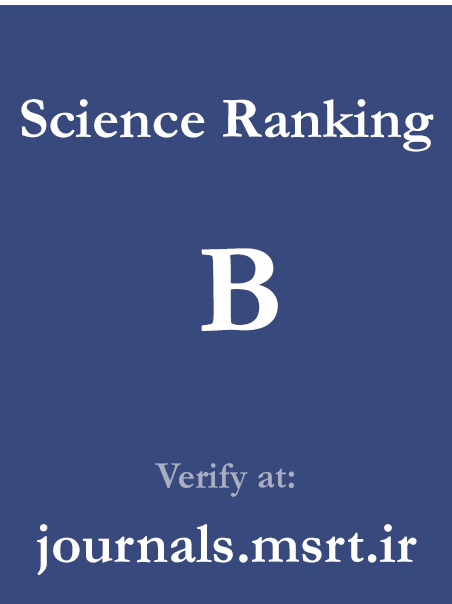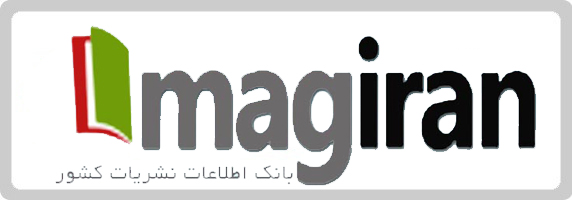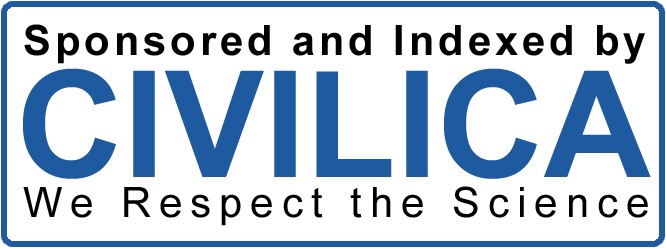Designing a Paradigmatic Model of Social Media in Addressing Environmental Issues of Electronic Waste in Iran
Keywords:
electronic waste, media model, environmental issues, social mediaAbstract
The present study was conducted with the aim of designing a paradigmatic model of social media—specifically Instagram and X (formerly Twitter)—in addressing the environmental issues of electronic waste in Iran. From the perspective of its purpose, this research falls within the category of applied–developmental studies. The participants consisted of two groups of experts: theoretical experts (professors and researchers in the fields of media, communication, and environmental management with expertise in media marketing) and practical experts (managers and specialists working in waste management organizations and social media activists involved in the environmental issues of electronic waste). Using theoretical sampling and continuing the interview process until reaching theoretical saturation, a total of 12 participants were selected. Data analysis was conducted using the grounded theory method with the assistance of MaxQDA. The findings indicated that causal conditions (including political and legal awareness, socio-cultural, economic and commercial, and technological and innovative factors) provided the foundation for the emergence of the core phenomenon (i.e., the role of social media in representing environmental issues related to electronic waste). This phenomenon developed within the context of contextual conditions (such as the institutional structure of information dissemination and governmental policymaking) and under the influence of intervening conditions (such as the limitations and challenges of social media) in Iran. Under these circumstances, a set of strategies emerged—particularly the production and redistribution of environmental content on social media—which led to outcomes in three domains: improving the management and recycling of electronic waste, developing economic aspects related to recycling, and influencing policymaking and audience behavior change through the media. The findings of this study can provide an appropriate basis for media policymaking and environmental planning in the country.
Downloads
References
1. Bhardwaj LK, Rath P, Jain H, Choudhury M. Exploring the effects of e-waste on soil, water quality and human health. Discover Civil Engineering. 2025;2(1):12-31. doi: 10.1007/s44290-025-00167-2.
2. Dutta D, Rautela R, Gujjala LKS, Kundu D, Sharma P, Tembhare M, et al. A review on recovery processes of metals from E-waste: A green perspective. Science of the Total Environment. 2023;859(2):160-85. doi: 10.1016/j.scitotenv.2022.160391.
3. Jain M, Kumar D, Chaudhary J, Kumar S, Sharma S, Verma AS. Review on E-waste management and its impact on the environment and society. Waste Management Bulletin. 2023;1(3):34-44. doi: 10.1016/j.wmb.2023.06.004.
4. Liu K, Tan Q, Yu J, Wang M. A global perspective on e-waste recycling. Circular Economy. 2023;2(1):28-47. doi: 10.1016/j.cec.2023.100028.
5. Zormand F, Hassani Q, Roustaei N, Rezaei S. Estimating the Amount of Electric and Electronic Waste Generated by Households and Government Offices Using Consumption Patterns. Health and Environment. 2025;18(1):77-102.
6. Erkmen AN, Ulber R, Jüstel T, Altendorfner M. Towards sustainable recycling of critical metals from e-waste: Bioleaching and phytomining. Resources, Conservation and Recycling. 2025;215(2):101-20. doi: 10.1016/j.resconrec.2024.108057.
7. Goyal S, Gupta S. A comprehensive review of current techniques, issues, and technological advancements in sustainable E-waste management. e-Prime: Advances in Electrical Engineering, Electronics and Energy. 2024;9(2):100-19. doi: 10.1016/j.prime.2024.100702.
8. Pourtabarestani MS, editor Examination of the Status of Electronic Waste in Iran. Second National Conference on Green Waste Management; 2022; Ardabil.
9. Abbaseh Zadeh A, editor Electronic Waste: A Critical Examination of Unimaginable Growing Pollutants, Regulations, and Environmental Effects in Tehran. Tenth International Conference on Civil Engineering, Architecture, and Urban Management; 2023.
10. Alipour Sa-D, Jafari Varamini AH, Reza Soltani S. ElectroCap and Management of Electric and Electronic Waste in Tehran. Waste Management. 2021(19):24-31.
11. Leclerc SH, Badami MG. Informal e-waste flows in Montréal: implications for extended producer responsibility and circularity. Environmental Management. 2023;72(5):1032-49. doi: 10.1007/s00267-023-01857-2.
12. Jami R, Shahryari Z. Management of Electronic Waste. New Research in Civil Engineering. 2024;14(1):265-78.
13. Rasakhi S, Khodamolhusseini SH. The Effect of Green Technology and Innovation on Electronic Waste Production in Selected OECD Countries. Industrial Economics Research. 2023;7(24):69-82.
14. Singh A, Goel A, Chauhan A, Singh SK. Sustainability of electronic product manufacturing through e-waste management and reverse logistics. Sustainable Futures. 2025;9(3):77-95. doi: 10.1016/j.sftr.2025.100490.
15. Gaur TS, Yadav V, Prakash S, Panwar A. Integration of industry 4.0 and circular economy for sustainable E-waste management. Management of Environmental Quality: An International Journal. 2025;36(5):1304-25. doi: 10.1108/MEQ-07-2024-0277.
16. Lee J, Choi H, Kim J. Environmental and economic impacts of e-waste recycling: A systematic review. Chemical Engineering Journal. 2024;494(4):152-78. doi: 10.1016/j.cej.2024.152917.
17. Sharma M, Kaushal D, Joshi S, Kumar A, Luthra S. Electronic waste disposal behavioral intention of millennials: A moderating role of electronic word of mouth (eWOM) and perceived usage of online collection portal. Journal of Cleaner Production. 2024;447(1):121-42. doi: 10.1016/j.jclepro.2024.141121.
18. Talebzadeh Nahr N. Examining the Recycling of Electronic and Electrical Waste. Psychology, Educational Sciences, and Social Sciences. 2024;22(1):121-39.
19. Matala LS. Improving citizen-based monitoring in South Africa: A social media model. African Evaluation Journal. 2024;12(1):719. doi: 10.4102/aej.v12i1.719.
20. Fahmy NN, Hamed EM, Khalil MM. The Use of Universities' Students of One of The Social Media Sites and Its Relation to Cognitive Impacts and Attitudes towards Restriction of Electronic Wastes. Journal of Environmental Science. 2023;52(1):73-102. doi: 10.21608/jes.2023.182071.1430.
21. Qavami Poor Sarshokhe M, Mahmoodi AR. Analyzing Ethical Issues in the Age of New Media and Social Networks (Presenting an Ethical Framework and Practical Solutions). Studies in Applied Ethics. 2024;14(77):75-106.
22. Ghazavi SF, Rasooli MR, Gharanmayehpour A. Providing a Paradigmatic Model of Broadcasting in Gaining Public Satisfaction through New Media Diplomacy. Visual and Audio Media. 2024;18(52):79-112.
23. Mahmoodi Meymand M, Falsafi Fard M, Khademi SM, Hosseini MH. Designing and Explaining a Smart Marketing Campaign Model for Startups on Social Media. Smart Marketing Management. 2024;5(4):146-72.
24. Ghaderi MA, Rahimi G. The Role of New Media Technologies in the Country's Economy. Sociology of Communications. 2024;4(15):59-80.
25. Babakhani S, Majidi Gahroodi N, Asadi A. The Ideal Pattern of Political Culture for New Media Users in Iran. New Media Studies. 2024;10(38):109-42.
26. Shahghasemi E. New Media: A Critical Introduction. Tehran: Research Institute for Culture, Art and Communication; 2021.
27. Saeedzadeh M. Electronic Recycling and Management of Electronic Waste. Environmental Sciences and Geography. 2025;11(1):1-14.
28. Mahmoodi Aznavah A. Assessing Countries' Performance in Recycling Electrical Waste. Tagh. 2021;2(4):14-9.
29. Tran NTK, Van Nguyen L, Ly VS, Nguyen TK, editors. The Effect of Social Media Marketing on Consumers'e-Waste Recycling Intention to Participate: The Case of the Vietnamese Market. European Conference on Innovation and Entrepreneurship; 2024.
30. Shokoohyar S, Akbari E. Designing a Sustainable Model for Recycling Electronic Waste. Research in Production and Operations Management. 2016;7(2):137-52.
31. Wang P, Zhang LY, Tzachor A, Chen WQ. E-waste challenges of generative artificial intelligence. Nature Computational Science. 2024;4(11):818-23. doi: 10.1038/s43588-024-00712-6.
32. Kavil YN, Alshemmari H, Alkasbi MM, Alelyani SS, Orif MI, Al-Farawati RK. Electronic waste and environmental diplomacy: How GCC E-waste management interfaces with the Stockholm Convention. Journal of Hazardous Materials Advances. 2025;17(1):25-46. doi: 10.1016/j.hazadv.2025.100610.
33. Glaser BG, Strauss AL, Strutzel E. The discovery of grounded theory; strategies for qualitative research. Nursing research. 2017;17(4):364. doi: 10.1097/00006199-196807000-00014.
Downloads
Published
Submitted
Revised
Accepted
Issue
Section
License
Copyright (c) 2025 Maryam Rabiei (Author); Ali Jafari; Hossein Basirian Jahromi (Author)

This work is licensed under a Creative Commons Attribution-NonCommercial 4.0 International License.




